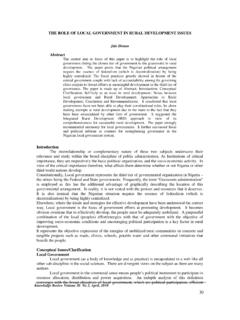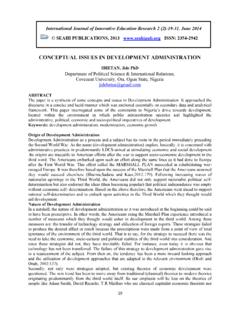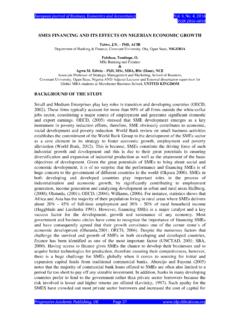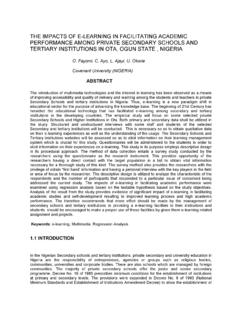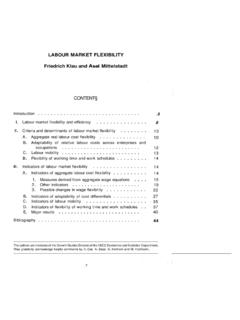Transcription of Effects of Workplace Ethics on Employees and ...
1 International Conference on African Development Issues (CU-ICADI) 2015: Social and Economic Models for Development Track Effects of Workplace Ethics on Employees and Organisational Productivity in Nigeria Adeyeye, , Adeniji, A. A.,Osinbanjo, , Oludayo, Business Management Department, Covenant University, Ota, Ogun-State, Nigeria anthonia. adenij i@covenantuniversi ty. edu .ng Abstract-Man's abysmal failure to uphold ethical behaviour within the framework of employment relationship, necessitates continuous interrogation of the complex issues, which arise from the asymmetry between productivity and Employees ' commitment. This paper examines the Effects of etiquette and unethical behaviour on employee commitment and productivity in Nigeria. A descriptive survey research method was adopted for the study using one hundred and eleven valid questionnaires, which were administered on Employees in Government Establishments, Organised Private Sector, Indigenous, Asian and Lebanese Companies operating in Ikeja, Oshodi, Ikorodu, Isolo and lganmu Industrial Estates of Lagos State, Nigeria.
2 Secondary data as well as documented evidence were also reviewed and used for the study. The sampling procedure was carried out randomly. The data collected were analyzed through Structural Equation Modelling and supported by descriptive statistics. Each item was based on a 5-Point-Likert scale. AMOS 22 was adopted in testing the study hypotheses; the data was presented with the use of SPSS while Structural Equation Modeling (SEM) was utilized due to its generality and flexibility to evaluate the validity of regression and correlation between the observed variables. The results show that significant relationship exists between ethical standards and organisational productivity, in Nigeria and that integrity cum discipline have negative impact on improved productivity level of the organization, which could be attributed to the nature of these virtues being abstract and could only be seen or observed overtime. The study suggests that all government agencies such as National Pension Commission (PENCOM), Nigerian Investment Promotion Commission (NIPC), Economic & Financial Crimes Commission & Independent Corrupt Practices, etc.
3 Saddled with the duty of ensuring etiquette in workplaces, should discharge their responsibilities more diligently and sanction organisations found guilty of unethical conducts in business concern and employment relationships. Index Terms -Work Ethics , Work Attitudes, Teamwork, Integrity, Self-Discipline, Profitability 267 I. INTRODUCTION Ethical behaviour and the prevailing system of employment relations in any work organizations is very crucial for general development, the production of goods and services, both for domestic consumption and international trade or exchange, creation of national wealth, the attainment of political stability and the inclusive benefits of sustainable human developments. In other words, how well organizations adhere to ethical standards, obviously, determines the well-being of all the stakeholders, the organisation's productivity and the subsequent profitability, as well as the macroeconomic growth and development of the nation [5]. The concept of efficiency as applicable to the context of employment relationship is a function of proper management of Employees at work, including the adherence to Workplace ethical standards.
4 Admittedly, work dominates the lives of most men and women, and the management of Employees , both individually and collectively, remains a central feature of organizational life [22]. The totality of the essence of work in society is that it is the primary determinism around which human lives are ordered, organizations improved and nations are developed. Also the primacy of work in society and the critical role of the production function have naturally contributed to the growth, development and advancement of nations throughout human history. In practical terms, nations are in existence to provide security, safety and most importantly developments to people who had surrendered their sovereignty in exchange for the aforementioned necessities of life, using organizations and all human resources available to them. Indeed, organizations advance the fortunes of nations through efficiency, productivity, output level and performance, as engendered by the institutional labour or a group of people known as workers.
5 These workers are human beings with aspirations, hope and feelings. They render their human efforts (labour) in exchange for International Conference on African Development Issues (CU-ICADI) 2015: Social and Economic Models for Development Track equitable wages and salaries, good physical working environment and longevity of employment relationship, anchored on ethical standards and human resource best practices, [ 4]. Any behaviour contrary to the expectations of these actors would rather hinder the trajectory of production processes and the development of the organizations. Since national development is dependent on what the labour can generate by way of Gross Domestic Products (GDP), a substantial attention must be paid to the agreement legally, socially and economically entered into by all the stakeholders for the parties to enjoy the expected efficiency, equity and development, which are the main objectives of employment relationship and the overall impact on the organizational productivity.
6 Statement of Problem The desperation of the productive enterprise to achieve corporate goals and workers' desire for equity have naturally affected etiquette, integrity, self discipline and by extension the level of performance and productivity within the framework of employment relationship [5]. Hitherto, Nigerian workers were ranked among the best in world, given a conducive work situation. Today, the rating has developed far below average as Nigerian workers only care about what he can benefit from employment relationship. Ultimately, this study is to see standards and favourable situations in the work system acting as a catalyst to increasing performance of Employees , in terms of efficiency, effectiveness and real output. Admittedly, globalization and its concomitants pose a potent challenge to organized labour, hence necessitates the adoption of a proactive strategy in the continuous interface with employers, management and government and onerous pursuit of the development agenda in Nigeria.
7 Gone were the days of irresponsible trade unionism. This is another cogent reason for the research. II. REVIEW OF LITERATURE The Oxford Advanced Leamer' s Dictionary defines Ethics as "the science which deals with morals" Ethics is the systematic study of the fundamental principle of the moral law; or as normative science ofhuman conduct [7]. This implies that Ethics is basically a normative science, as distinct from the descriptive or empirical sciences. Moral principles that form the subject matter of Ethics are about the way people ought to behave in terms of the commitment to their work and their team, integrity and being self-disciplined. It follows that Ethics , primarily is the critical investigation of the norms of conduct to which human actions ought to conform. According to [27], the term Ethics refers to the fundamental principles of right and wrong; it is the behavior that is consistent with those principles. Conceptually, discipline and 268 indiscipline are dimensions of human behavior.
8 Disciplined behavior is the sine qua non for individuals, organizations and national survival and development. Discipline and indiscipline, just and unjust, right and wrong, can be directly associated with Ethics . However, work Ethics as noted by Cascio, is the accepted standards in terms of personal and social welfare of employee , their work attitudes, self-discipline and commitment to their assignments [ 16]. V elasquaez observes that work Ethics is the principle of conduct governing an individual or a group in the work place, which makes them conform to the ethical standards thus influencing organizational output level and the resultant profitability level [38]. The work attitudes, integrity, self-discipline, teamwork, emphasis on quality, commitment and productivity of the Nigerian workers have painted a rather negative picture of an apathetic, uncommitted men and women, who are unresponsive to motivational techniques. The Nigerian workers have been described as indolent, apathetic and unresponsive to motivation and generally, not willing to put forth maximum productive efforts [35].
9 Whichever way we look at it, the Nigerian workers are what we have, hence we must encourage them to make meaningful contribution to the development of the nation by becoming more productive. III. TEAMWORK AND ORGANISATIONAL PRODUCTIVITY Every organization, large or small, private or public enterprise, struggle to acquire productivity so as to achieve success and maintain a valuable image in this present days of stiff organizational competitions. Though the population of workers in an organization may be large and organizational productivity also low with no improvement in their products, yet this could be as a result of absence of teamwork in the organization. Absence of teamwork in the organization is the failure of an organization to coordinate works into work groups so as to tap from the respective human resources the organization possesses [19]. Teamwork is the cooperative and coordinated efforts on the part of a group of persons who work together as a team. It is the willingness of people to work together to achieve a common goal.
10 A team exists when individual strengths and skills are combined with teamwork in the pursuit of a common cause in order to produce meaningful results for the team members and the organization [ 4]. Thus, a team combines individual strength with a shared commitment to performance. There is a saying that many hands make light work. The reason not far-fetched, in that more can be achieved as a collective than individual. For instance, with teamwork, creativity is achieved. Because we have different skills, knowledge and personal attributes, by utilizing these different aspects in a team, more ideas can International Conference on African Development Issues (CU-ICADI) 2015: Social and Economic Models for Development Track be generated and more creative solutions brought on board thereby leading to better results and thus improve on the organizational results/ productivity. Not only that, even the best qualified individual cannot have all of the skills to do everything. While some persons excel at coming up with the ideas, some others have to be counted on when it comes to implementing and follow through of a plan [3].


